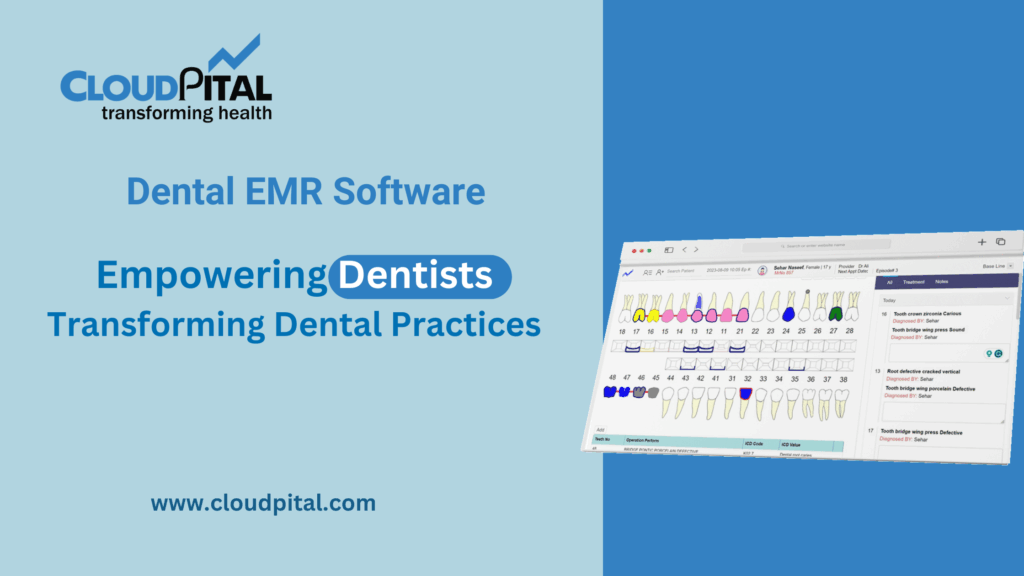Cloudpital # 1 is one of the top Medical Solutions Artificial Intelligence has transformed various industries and sectors. Notably, this application impacts the healthcare sector in varying ways, which range from diagnostics and treatment plans to patient care and operation efficiency. This essay will examine the multiple roles that AI plays in contemporary medicine applications, the benefits, challenges, and prospects for the future.
Cloudpital # 1 Medical Solutions

Improving Diagnostics
The most impactful effect of Artificial Intelligence is on diagnostics in healthcare. Much of the sub-components of AI, such as machine learning algorithms, analyze massive medical data. They will sometimes find patterns or anomalies that the human eye might miss. AI has been successful in radiology within the imaging field. Algorithms read X-rays, CT scans, and MRIs to determine if a tumor is present, if there’s a fracture, or some other ailment.
AI is being most interestingly used in mammography. Medical Solutions Researchers have demonstrated that AI may increase the detection of breast cancer rates while proportionally reducing false positives. This could not only render diagnoses more accurate but also ease the load on radiologists since they will be kept busy only with cases that are difficult for them.
Personalized Medicine
Another trend brought about by AI is personalized medicine, whereby treatments are tailored specifically to individual patients through their genetic makeup, lifestyle, and environmental factors. From the genomics sequencing data, AI can predict how patients would react to certain options for treatment. In this respect, healthcare providers create improved treatment plans, especially in the field of oncology.
As an example, AI can scan genomic data to determine the mutation in the cases of cancerous cells with the help of oncologists to choose the targeted treatment that may be more likely to work.
Precision medicine isn’t just bettering outcomes but also greatly cutting down on unnecessary side effects by avoiding treatment that does not work.
Predictive Analytics
Predictive analytics is an area where AI has surpassed the thinking of people by a lot. Analysis of the patient’s historical data by AI would determine risk factors and predict the probability of diseases before they occur. With this proactivity, healthcare providers can take preventions in advance, leading to even better patient outcomes and reduced healthcare costs.
For instance, AI models can predict the onset of chronic conditions such as diabetes or heart disease based on lifestyle choices, family history, and levels of biomarkers in individuals. This therefore enables preventive interventions, such as lifestyle adjustments or pharmacological treatment, to be carried out before disease progression.
Operational Efficiencies
This AI is having an impact on the use of clinical output to augment efficiency in healthcare operations. Routine administrative tasks include appointment scheduling, keeping patient records, and billing. It can handle matters like physician note transcription with the help of NLP tools to carry out automation of documentation procedures and for further communication between healthcare providers and patients.
AI can also optimize the distribution of resources in a hospital. There are algorithms that can predict the number of patients expected to report in the facilities of Medical Solutions, thus enabling better and more effective management of staffing and other resources during periods of high demand such as when influenza seasons are killing people or in case of a pandemic.

Patient Engagement and Monitoring
Improvement in patient engagement and remote monitoring is one of the primary roles AI plays. The general growth in wearables in health technology, as well as mobile health applications, allows AI to read data from these devices and then give patients real-time health monitoring. For example, AI can track heart rates, activity levels, sleep patterns, among others, and then alert the healthcare provider of important trends noticed.
The interactions with patients are further intensified by the AI-powered chatbots and virtual health assistants. In Medical Billing The set of tools can also be used to give information on a patient’s condition, remind them about medication, or clarify frequent questions on health. AI allows for a more active role in healthcare from the patient, which may mean better results.
Drug Discovery and Development
AI is revolutionizing the process of drug discovery in bringing new medicines to the market considerably quicker and less expensive than before. While it used to take more than a decade and billions to develop new drugs, AI has reduced this time and spends because it can identify candidates, predict the efficacy of drugs, and analyze huge medical data for insights.
The algorithms of AI can screen large datasets that include both the scientific literature and the results from clinical trials, helping identify potential compounds. Further, AI can simulate how different drugs could work with biological systems and thus aid researchers to prioritize candidates for further testing. This capability is not only speeding up the discovery process but also increasing the chances of success in clinical trials.
Ethical Considerations and Challenges
However, although this integration has brought a lot of promising areas within healthcare, it has also raised several ethical and operational issues in integrating AI in the field. The first and foremost among them is data privacy. Good algorithms for AI rely extensively on comprehensive access to patient data and thus raise questions about consent and security of data. Therefore, any sensitive information regarding patients would need to be well protected, and the security measures must be quite robust on the part of healthcare organizations in order to avoid such risks.
Algorithmic bias is another challenge. Unless the data used to train the models are representative of the heterogeneity of the patient population, the potential for biased outcomes is increased. For example, an AI system that works primarily on information drawn from one particular demographic may not work as well for the others, and could paradoxically exacerbate health disparities.
Future Potential
The future for AI in the healthcare sector is tremendous. Improved technologies are likely to bring a more advanced deployment of such applications. One of the promising areas is the convergence between AI and telemedicine. With more virtual care unfolding into the horizon, AI will make some of these services even sharper by analyzing data in real time and providing support during consultations.
Further in the future, such clinical decision support would be provided by AI systems which make recommendations based on a patient’s unique data profile, thus allowing for better customization and outcome in treatment plans in RCM.
Conclusion
AI is playing a growingly important role in modern solutions in medical fields, changing diagnostics, personalizing treatments, improving operational efficiency, and engaging patients. However, despite all these problems-data privacy, algorithmic bias-the actual huge advantages that AI will bring to healthcare cannot be underrated. This is because AI has lots of contributions waiting to be given to technology, and since the future continues painting its colorful descriptions of an evolved yet less eclectic world, AI would more likely shape the future of medicine and pave the way for a more efficient and effective patient-centered healthcare system. Such a journey has only just begun; there are, therefore, great potentials in AI application toward improving medical solutions for healthier days forward.
Click to Start Whatsapp Chatbot with Sales
Mobile: +966547315697
Email: sales@cloudpital.com
HRMS in Lahore,Attendance Software in Lahore,Payroll Software in Islamabad
What Role Does AI Play in Modern Medical Solutions? similar software solutions prices were updated on 2025-07-02T03:54:59+00:00 in Saudi Arabia in Mecca, Medina, Riyadh, Khamis Mushait, Yanbu, Jeddah, Dammam, Unaizah, Uqair, Ha’il, Ta if, Al Bahah, Dhahran, King Abdullah Economic City, Najran, Diriyah, Qatif, Khafji, Jubail, Abqaiq, List of Cities and Towns in Saudi Arabia, Ras Tanura, Turubah, Jazan Economic City, Knowledge Economic City, Medina, Khobar, Abha, Tabuk, Saudi Arabia, similar software solutions prices were updated on 2025-07-02T03:54:59+00:00 We also provide in Saudi Arabia services solutions company in Hafar Al-Batin, Udhailiyah, Al-Awamiyah, Hofuf, Hautat Sudair, Buraidah, Tayma, Duba, ‘uyayna, Saihat, Al-Kharj, Al-ula, Jizan, Rumailah, Ar Rass, Arar, Shaybah, Al Majma’ah, Rabigh, Dhurma, Haradh, List of Saudi Cities by Gdp Per Capita, Badr, Sudair Industrial City, Baljurashi, Shaqraa, Al-Khutt, Habala, Ad Dawadimi, Dawadmi, Layla, similar software solutions prices were updated on 2025-07-02T03:54:59+00:00 Price is SAR 100 and this was updated on updated on 2025-07-02T03:54:59+00:00 similar What Role Does AI Play in Modern Medical Solutions? software solutions prices were updated on 2025-07-02T03:54:59+00:00 in Saudi Arabia in Haql, Afif, Al-Abwa, Farasan, Al-Jaroudiya, Thadig, Al-Thuqbah, Al Wajh, Almardmah, Al-Zilfi, Muzahmiyya, Prince Abdul Aziz Bin Mousaed Economic City, Tharmada’a, Skaka, Um Al-Sahek, Sharurah, Tanomah, Bisha, Dahaban, Al Qunfudhah, Qurayyat, Saudi Arabia, Ha’ir, as Sulayyil, Al Lith, Turaif, Al-Gway’iyyah, Samtah, Wadi Ad-Dawasir, Az Zaimah, Safwa City, Jalajil, Harmah, Mastoorah, Hotat Bani Tamim, Jabal Umm Al Ru’us, Rafha, Qaisumah, Al-Ghat, Hajrah, Al-Hareeq. Excerpt: Jeddah (also spelled Jiddah, Jidda, or Jedda; Arabic: Jidda) is a Saudi Arabian city located on the coast of the Red Sea and is the major urban center of western Saudi Arabia similar software solutions prices were updated on 2025-07-02T03:54:59+00:00 Price is SAR 100 and this was updated on updated on 2025-07-02T03:54:59+00:00
10-3-2024



